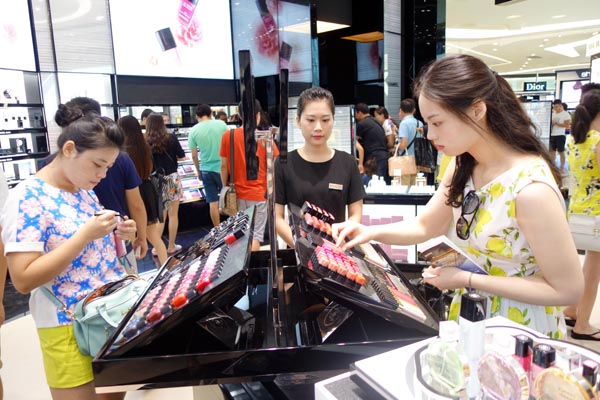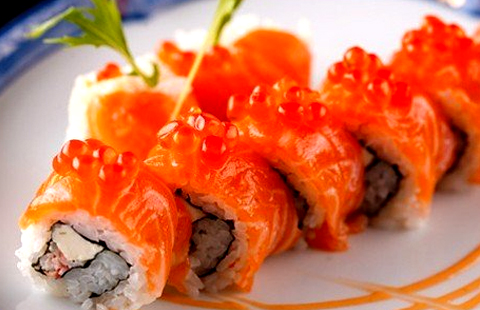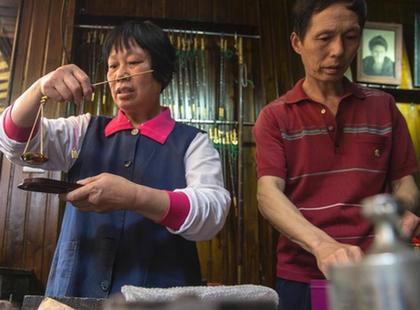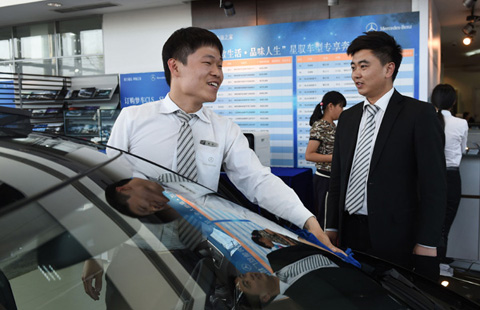China slashes import tax on skincare to shoes to spark domestic demand
(Agencies) Updated: 2015-05-25 15:51
 |
|
Tourists select cosmetics at Sanya Haitang Bay International Shopping Mall.[Photo by Huang Yiming / China Daily] |
China will slash import tariffs on consumer goods including skincare products, Western-style clothes and diapers from June, potentially giving a fillip to global brands and bolstering domestic consumption amid faltering economic growth.
The Ministry of Finance said in a statement on Monday it would lower import taxes for some products starting from June 1 by an average of over 50 percent as an "important measure to create stable growth and push forward structural reform".
The decision follows a statement by China's State Council, the country's Cabinet, in April that it would look to reduce import tariffs on some consumers goods to stoke domestic spending and support the slowing economy at a time when record numbers of cash-rich Chinese tourists are splurging overseas.
"Going abroad costs money, 'daigou' shopping agents are a bit risky and it's hard to spot fakes online. So if import taxes came down to a certain level, that would certainly be an option," said Tang Yenan, 29, an architect in Shanghai.
The move comes as annual economic growth in the world's second biggest economy slowed to a six-year low of 7 percent in the first quarter - partly driven by a downturn in investment and manufacturing - which has prompted a range of stimulus measures from Beijing.
China retail sales rose 10 percent last month, but eased from March as data showed that China's economy is under persistent pressure from soft demand at home and abroad.
Price gap
Import tariffs for Western-style clothing will be reduced to between 7-10 percent from 14-23 percent, and taxes on ankle-high boots and sports shoes cut in half to 12 percent, the Ministry said. Tariffs on diapers and skincare products will drop to 2 percent from 7.5 percent and 5 percent, respectively.
Companies that stand to benefit from lower import duties include diaper makers Procter & Gamble Co and Japan's Unicharm Corp, US sports shoe firms Nike Inc, and Adidas AG and cosmetics companies L'Oreal SA and Korea's Amorepacific Corp.
Chinese consumers often grumble about paying higher prices for goods than in other markets, partly due to steep import taxes. Analysts say consumers in China pay around 20 percent more for luxury goods than their counterparts in Europe.
This often forces shoppers to splash savings overseas or through "daigou" shopping agents, which has helped drive global luxury sales even as China's own market is set to contract this year, according to a May report from consultancy firm Bain & Co.
The Ministry said lowering duties should steer a shift in consumers' shopping habits, helping boost imports and domestic consumption.
Any immediate impact, however, could be limited because import taxes are only one part of the price gap between China and other markets, said Robin Kerawala, Shanghai-based partner at consultancy SmithStreet.
"The prices on these imported products are significantly higher in China not just because of import tax but because of VAT and multiple layers of distribution with everyone in the value chain earning their margin."
- Time to take a hard look at forex regulations
- Top 10 provinces with the highest per capita deposit in China
- Electronics expo opens in Shanghai
- Muyang plants seeds of growth abroad
- Shanghai investors lead pack
- Share prices surge on buying support
- Qihoo launches new security product
- Officials, businessmen in Xi'an to renew Silk Road glory

















